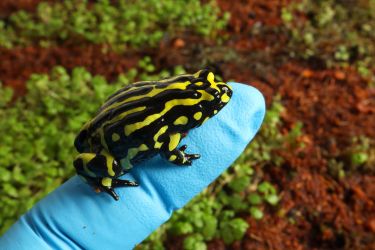Genomics

Sciences & Technology
Research
By sequencing the genome of the endangered Southern Corroboree Frog, we could save it
For the first time, the genome of the Southern Corroboree Frog has been sequenced – a major milestone in efforts to conserve this critically endangered species

Sciences & Technology
New genomic toolkit set to boost Australian crop industry
Scientists are in a battle to keep the world’s food supply dependable, and new research into crop genomes is helping to lead the way

Health & Medicine
The future of cancer is very personal
Precision medicine allows us to develop treatments for a specific disease in one person. But we must ensure all Australians can access these benefits

Sciences & Technology
The fly DNA fighting killer bacteria
The genome of an Australian fly has won an evolutionary “arms race” against a killer bacteria by evolving to co-exist with it

Health & Medicine
Following cancer’s status updates
Developing cancer tumours shed microscopic amounts of information into our bloodstream and deciphering these messages provides new ways to diagnose and treat it

Health & Medicine
Our genetic strength in numbers
By combining global datasets, researchers can give more people access to genomic medicine, personalised treatment and knowledge of human DNA and disease

Health & Medicine
Will Australia be left behind in the cancer genomics revolution?
Australia’s world-class medical research has transformed cancer care, but patients may not see the benefits of new genetic testing without new funding models

Sciences & Technology
Using genetics to conserve wildlife
Conserving wildlife with breeding programs doesn’t help threatened species to adapt, but synthetic biology may be able to bring protection by adapting genetics

Sciences & Technology
Live cell DNA architecture in real time
Seeing our invisible DNA architecture reveals that our genome is much more than a linear code, but rather an ever-changing blueprint

Health & Medicine
Q&A
Q&A: What we do (and don’t) know about Omicron
The latest COVID-19 variant, Omicron, has sparked international travel bans, stricter quarantine and a lot of “hype” worldwide – but we still have a lot to learn about the mutation